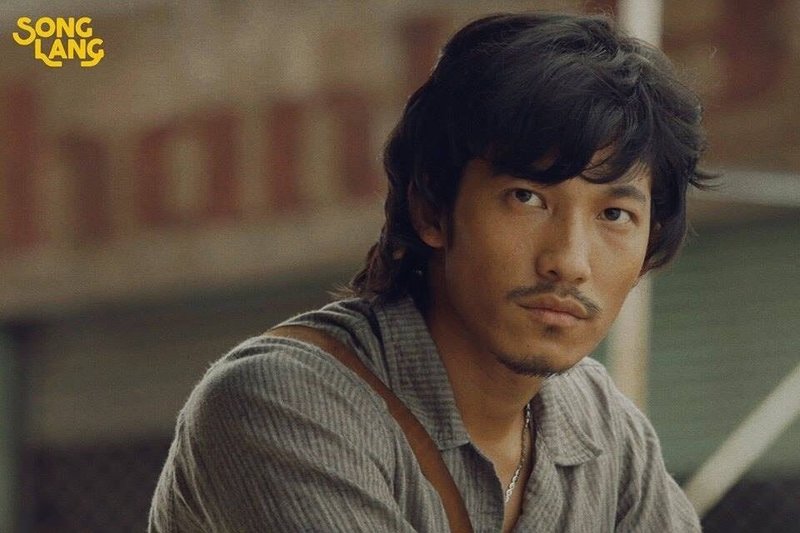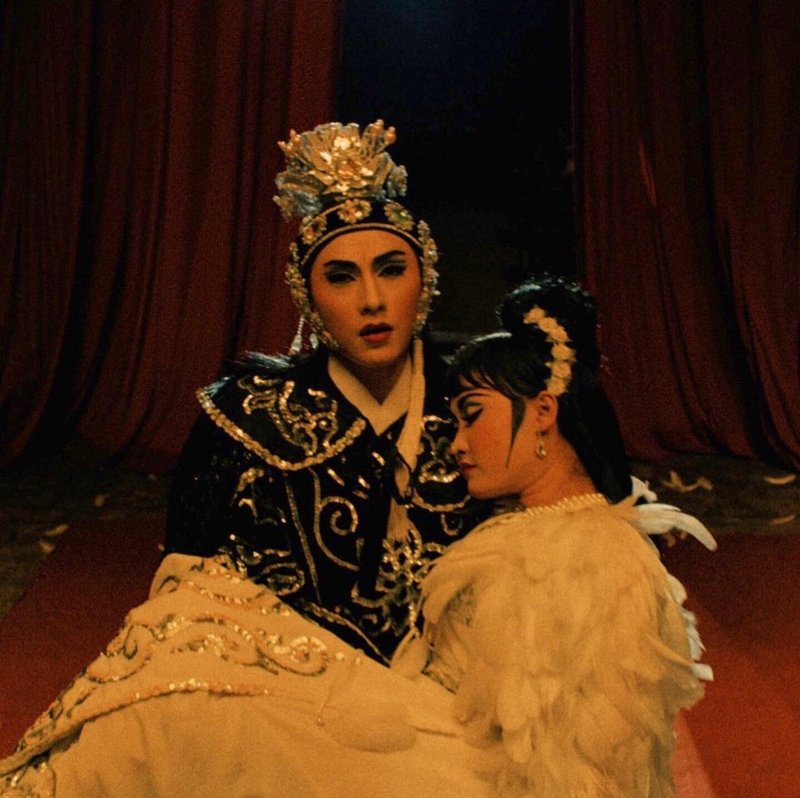
You should watch "Song Lang (The Tap Box)"
First Feature Film by Leon Le
It was an excellent work that far exceeded my expectations.

The road show of "Song Lang (The Tap Box)" (2018 / Vietnam) started on February 22 in Japan.
On the first day, I was looking forward to the premiere with the stage greetings of director Leon Le and actor Lien Binh Phat, but I couldn't finish my work and had to give up.
Speaking of Asian films, there have been many high-quality films made in Thailand, Malaysia and the Philippines in recent years.
It was my first time to watch a Vietnamese movie, but I was overwhelmed by the work.
I had to wait for a few days to calm down before writing my thoughts.
Leon Le was born in Saigon (current Ho Chi Minh City) in 1977. At the age of 13, he moved to the United States with his family, and after working as an actor, dancer and singer on Broadway, he became a director.
He has released several short films, and this "Song Lang (The Tap Box)" was his feature-length debut.
He lives in New York and is a photographer, and has created a limited edition photo book for the movie.

Scars of the Vietnam War
The story is set in "Saigon in 1980s".
Saigon was the capital of "South Vietnam" when Vietnam was divided into north and south at the 17th parallel.
The Vietnam War ended in 1975, and the following year the country was unified as the Socialist Republic of Viet Nam with Hanoi as its capital.
The "Saigon in the 1980s" still bears scars from the wartime when the same race was politically divided.
This is closely related to the background of the main character Dung and his deep pain.
Of course, you can enjoy watching this movie without knowing the political situation at that time, but it is easy to imagine that for the generation that understands this era, especially the people of Vietnam, it will be something special to be moved by.
Dung is a debt collector, working for a ruthless old woman who lends money.
The man known for his relentless, sometimes violent, collection was called "Dung Thunderbolt" and feared by everyone.
Leon Le managed to get the newcomer Lien Binh Phat to perform the story of Dung's human gentleness and cleanliness, in contrast to the rough face of the collector.
Lien Binh Phat, who was born in 1990, has succeeded in creating and acting roles so incredibly that it is hard to believe that this is not only his first appearance in a movie, but his debut as an actor.
His body looks like a martial artist and his eyes leave an overwhelming impression.
You can catch a glimpse of his sincerity and innocent mischievousness through interviews and making videos.
If he continues to perform in good works, he will undoubtedly make great strides as an actor in the future.
I was particularly amazed by the power of the fight scene.
This "Dung Thunderbolt" meets a star actor of the same age, Linh Phung, in the dressing room of a Cai Luong theater, where he goes out to collect money.
Cai Luong is a popular opera in southern Vietnam.
According to Naoya Sakagawa, a researcher in Southeast Asia who wrote an article in the pamphlet,
It was created in the early 20th century, about a hundred years ago, in the southern part of French territory, by adding "improvement" to the classical court drama Tuong. It is characterized by an unprincipled mixture of elements, incorporating not only traditional performing arts in Vietnam, but also Western music, as well as a wide variety of stories from various countries and regions, and localizing them.
...
Cai Luong was temporarily used by the government to spread socialism to the south after the 1975 North-South Reunification.
The title of the film, "Song Lang" is a Vietnamese folk instrument used to accompany the Cai Luong.
The star actor Linh Phung is played by Isaac, the leader of the Vietnamese idol group 365daband.
In contrast to "Dung Thunderbolt" he plays a delicate and ascetic young man, and the beauty and glamour he shows on the stage of Cai Luong, which can be called a play within the play, is truly of a Vietnamese star.
The vicious debt collector who rushed into the dressing room and the star actor of the troupe.
At first glance, the two appear to be living in a world of opposite extremes, but a certain event brings them close enough to share each other’s backgrounds.
Dung's late father was Cai Luong's accompanist and his mother was an actor.
The separation of parents and the loss of what was supposed to be a peaceful day had something to do with unified government propaganda.
Linh Phung, on the other hand, lost his parents in an accident. The bus his parents were on to see their son's first starring role had an accident.
The tragedy of Dung, where a harmonious family was torn apart by ideology.
The tragedy of Linh Phung, whose parents died in an instant.
In my eyes, these were metaphors for the disaster that the Vietnam War brought to the Vietnamese people.
The two young men who lived in the 80s were undoubtedly the generation that grew up during the war.
And the fact that Leon Le’s family emigrated to the United States may have something to do with Vietnam's postwar history.

The Aesthetics of "Subtraction"
Now, let me focus on the important point.
A catch phrase of this film released in Japan says, "The Story of Boy Meets Boy on the Sound of the Vietnamese Folk Instrument <Song Lan>".
The trailer also says, "When the friendship between two lonely souls turns into love ...".
In conclusion, in the film, Dung and Linh Phung don't touch each other, nor do they openly confess their affection.
The only sexual depiction is of Dung having violent sex with his girlfriend at home, but again, it avoids directly showing physical contact.
Director Leon Le himself admits that some people have simplified the film to "homosexual" but emphasizes that it's a "humanity" film.
In this sense, I have a slight concern that using terms such as "The Story of Boy Meets Boy" or "the friendship ... turns into love" in distributing the film, whether it is good or bad, may give a preconception to the film and may downsize it.
At the same time, however, it is not hard to imagine that if the distributors had not adopted such a bold and hasty advertising method, the film would not have received as much recognition as it does now, and as a result, the opportunities for screening would not have increased.
And if I were asked whether this "Song Lang (The Tap Box)" is a so-called "LGBT film," I would answer "You shouldn't force it into such a framework." But at the same time, I would also say " This is one of the most sophisticated LGBT films ever made."
That's because Leon Le's main intention is to send out a message that when people have special feelings for others, they shouldn't be tied to gender in the first place.
If you dare to add a category to the movie, it would be putting the cart before the horse.
However, I also believe that the strategy of categorizing the movie and betraying the audience's expectations in a vivid manner is also very effective in delivering the director's message.
I was a little dissatisfied with the articulations such as "The Story of Boy Meets Boy" and "the friendship ... turns into love" as if the secret of the magic had been revealed in advance, but now that I have finished watching it, I have no choice but to recommend "It's a very good movie, so just watch it yourself and feel it."
In "Carol" (2015), "Moonlight" (2016), "Call Me by Your Name" (2017), or "Bohemian Rhapsody" (2018), the sexuality of the main characters was openly depicted, and sexual relations also appeared in the scenes.
On the other hand, "Song Lang (The Tap Box)" avoids such straightforward expressions.
By keeping the explicit rendition away, the film was able to depict the changes in the relationship between the two.
It is, so to speak, a thorough aesthetics of "subtraction".

Life Shines Again
I don't think I should write much about the plot, but Leon Le's careful attention and gimmicks in setting the two characters are also the charm and highlight of the film.
The kindness, culture, fairness, and dedication that Dung is inherently possessed are reflected in the furnishings of his room as well as his attitude and facial expression toward people other than those he collects debts from, especially the weak.
After having an intense sex with Dung, his girlfriend complains about doing it "always on the floor."
Dung doesn't sleep with his girlfriend in his bed.
The night that Dung stayed with Linh Phung, he let Linh Phung sleep on his bed and he sleeps on the floor.
The movement and staging of the climax of the story are overwhelming.
By meeting Linh Phung, beautiful things like the "jewels in the robe" in Dung's life wake up.
One is revived by the encounter with the other.
Dung settles his distorted life and heads for the theater where Linh Phung is waiting.
Linh Phung performs that night as if he were totally a different person. The stage astonishes even the members of the troupe.
Performed at the theater is "Mey Chow and Chong Twei," a popular play of Cai Luong about a tragic love affair between a prince and a princess.
Dung and Linh Phung's destiny overlaps with Linh Phung's impassioned play.
Director Leon Le does not let Linh Phung talk about his secret love for Dung, but instead lets him speak on the stage of Cai Luong.
By focusing on Cai Luong, a very local traditional performing art from Vietnam, the film has gained value beyond time and borders.
In this regard, it may be an homage to "Farewell My Concubine" (1993), which depicts a half century of modern China based on Beijing opera.
By not thoroughly describing sexual relationships, this Vietnamese film advocated hymns for the diversity and richness of human sexuality, and at the same time, brought the universal story of "humanity" to the front.
Leon Le is a truly great director.

The reason why they are willing to draw a line between various emotions, such as "friendship", "romance", and "respect", is that they believe that social relations will proceed smoothly if they are separated in this way. However, we are well aware that in practice simple categorization is often difficult.
Director Leon Le gave birth to two Vietnamese youths at a slightly faded age.
Aside from the star actor Linh Phung, there's no evidence that Dung, who was working in the underworld, is still alive.
The last squall wipes out everything in Dung.
What happened between Dung and Linh Phung?
What did they think of each other after their fateful encounter?
They are eternal secrets that no one but themselves knows.
If you meet and love someone, you leave them one day.
You meet someone of your destiny, and love begins to grow. Your life, which seemed to have withered away, comes back beautifully.
If you can meet such a person even for a short time, life is worth something.
TEXT by HIGASHI SHINPEI(WRITER/EDITOR)
Translated by NOBU(ART HISTORIAN)
この記事が気に入ったらサポートをしてみませんか?
